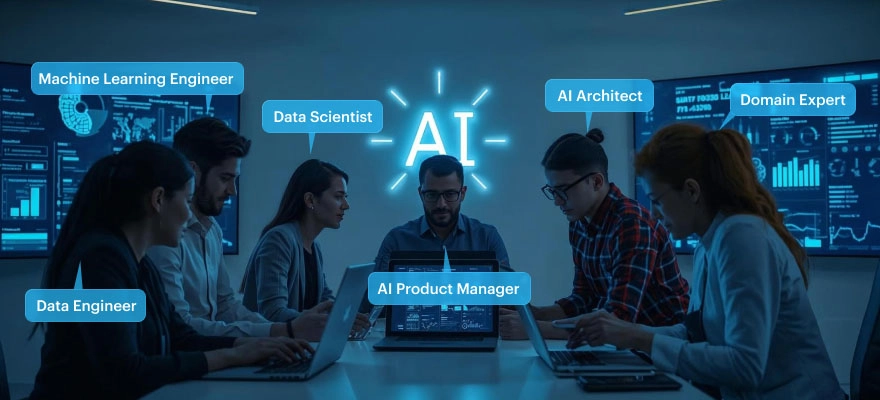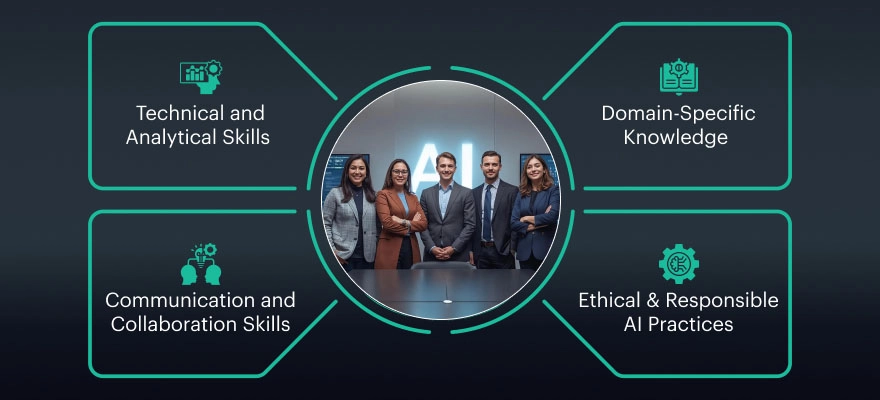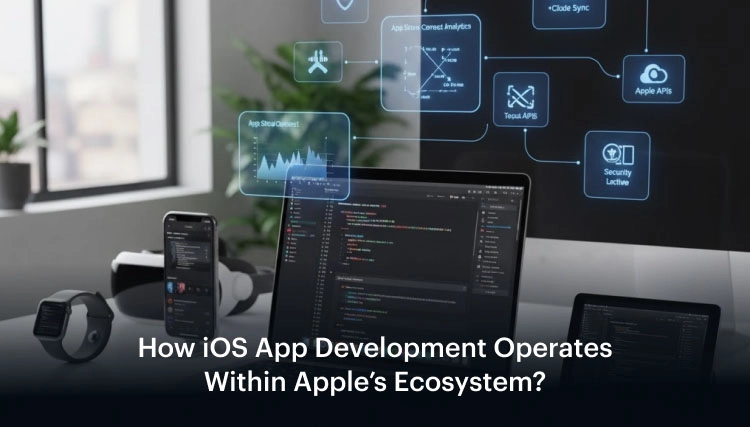How AI Services Build a Fully AI-Ready Product Team?

Table of Contents
AI is no longer an experimental technique; This is now the motivating power behind some of today’s most successful products. Companies utilise AI services to provide better, faster, and more engaging user experiences across individual e-commerce platforms, including intelligent chatbots in customer care.
With this spike in use, these models have changed weight by generating only AI models to keep the right AI team together to convert these models into market-ready solutions.
The importance of having a fully AI-ready product Team cannot be overstated. Many organisations invest in partners with AI Development Services or an AI Development Company, but without a clear strategy, even the most advanced equipment and technologies are unable to produce results.
A product team designed for AI development ensures that data pipelines, infrastructure and model life cycle are well controlled, while also addressing important areas such as user experience, compliance and moral AI practice.
Being “AI-ready” means much more than technical capability. This is about creating an environment where AI can initially move on from product use to distribution and then scale responsibly. This requires the opportunity to estimate challenges such as cross-functional cooperation, strong domain knowledge and prejudice, privacy and model operation.
AI developers hire developers, and with this general approach, they quickly strengthen the structure of their teams, and increased user makes innovations by bringing innovations to innovations.
In short, the creation of the A-ready product team is about converting AI into a tangible, scalable business property from a promising idea. It is about the combination of technology with vision and is to ensure that each member of the team not only contributes to AI to create a function but is also the basis for permanent product success.
Unlock Web Development Potential for Your Business Today
From roadmap to execution, we’ll help you implement AI that drives measurable growth.
What are the Core Roles in an AI-Ready Product Team?
Building a hit AI-ready product group goes beyond truly hiring some engineers and waiting for them to supply advanced AI solutions. A powerful crew requires a blend of technical expertise, domain expertise, and ethical oversight, working collectively to lay out, expand, and set up AI products that are both innovative and dependable.
Today, leading agencies investing in AI development services are prioritising established, move-useful teams in which each position contributes to the larger picture of AI innovation.
Here are the core roles that make up a fully AI-ready product Team:

1. AI Product Manager
The AI product manager acts as a contact between business goals and technical execution. They define vision for AI products, prefer capabilities and ensure that development corresponds to the user’s requirements and market opportunities.
Unlike conventional product managers, AI PMs also need a stable grasp of AI improvement standards like system getting to know models, data pipelines, and version deployment so that they can translate technical opportunities into commercial enterprise value.
2. Data Scientist
The data is at the centre of AI, and the data scientists are the ones who unlock its ability. They analyse complex datasets, create statistical models and extract insight to guide the decision.
In the context of the AI development company, it is important to use data from data science algorithms, validate hypotheses and ensure that AI services produce accurate, data-driven results.
3. Machine Learning Engineer
While scientific models are made, machine learning engineers take these models and make them production-ready solutions. They optimise algorithms, manage training processes and work closely with software engineers to ensure that the models can scale into the real world.
When Business Machine Learning appoints AI developers with engineering expertise, they get the technical muscle required to distribute the AI system that performs effectively under pressure.
4. Data Engineer
AI projects fail without reliable, clean and well-composed data. Computers have designed and maintained infrastructure that strengthens AI data pipelines, storage systems and integration frameworks.
Their role ensures that the AI team has access to high quality continuous data, which is important for accurate model training and long-term product performance.
5. AI Architect
An AI Architect is responsible for the overall technical strategy for AI solutions. They design scalable architecture, choose appropriate AI frameworks and set the standard to integrate the model with the existing system. In rapidly growing outfits, it ensures an AI architect that the AI-adoption is smooth, cost-effective and future-proof.
6. Domain Expert (Subject Matter Expert)
The AI solutions are just as good as their real-world counterparts. Domain experts bring industry-specific knowledge in the process of finance, healthcare, retail or production. Their expertise helps the AI development team adapt the model with industry standards, regulatory requirements and practical challenges.
What are the Essential Skills for Each Role?
The right people in the AI team have only half the story; Their skills determine whether your AI initiative is successful or stalls. When companies move to AI development services to launch the next generation AI products, emphasis has been placed on a combination of technical expertise with soft skills, domain understanding and moral awareness. Below are the necessary skills that create a fully finished product team.

1. Technical and Analytical Skills
Technology and data are at the center of any AI project. The AI development company requires strong foundations in mathematics, statistics and programming from all roles, data researchers and machine learning engineers to AI architects. Skills in Python, R, Tensorflow and PyTorch are important for AI development, while clouds ensure knowledge scale, such as AWS, Azure and Google Cloud.
Beyond coding, analytical thinking is as vital. Team members should be able to interpret large datasets, identify trends and convert ideas to practical solutions. Organisations that want to appoint AI developers should find people who can not only build, but can also change the model to increase performance, accuracy and cost-effectiveness.
2. Communication and Collaboration Skills
AI solutions are rarely built in isolation. They require cross-functional collaboration between product managers, engineers, designers and business interests. The technology teams and decisions make it possible to bridge the effective communication difference between teams and decision producers and ensure that AI products are suitable for user needs and business goals.
The A-Taiyar product team should be effective in explaining complex concepts such as nerve networks or data pipelines in regular language. This ability promotes better cooperation, reduces the obstacles in the project and ensures that every stakeholder considers “why” behind the decisions of AI.
3. Domain-Specific Knowledge
AI cannot thrive without context. Domain knowledge lets the AI Team design solutions that are not only technically advanced but also practically relevant. For example, a health-quality AI system requires knowledge of privacy rules for patient data, while a retail AI solution must understand customer behaviour and inventory management.
4. Ethical and Responsible AI Practices
As AI adopts rapidly, morality has become one of the trendiest technology subjects. From prejudice in algorithms to concerns about data secrets, companies can no longer risk ignoring the responsible AI practice. An effective AI team should be trained in moral disposition, regulatory compliance and responsible data use.
A moral and match manager ensures that the AI systems meet legal standards such as GDPR or HIPAA and maintain justice and openness. This not only protects businesses against iconic and legal risks, but also produces the user’s trust, an important factor in any long-term success with any AI initiative.
How to Build a Collaborative Culture?
No matter how effective your AI team is, the success of the AI development depends on how people work together. The construction of the AI system is rarely a single work; This requires developers, computer researchers, designers and business leaders to basically match. To create AI-ready product teams, the collaboration must be most of the culture.
Here’s how organisations can achieve that.
1. Cross-Functional Teamwork
AI projects often bring people with very different skill sets together. A computer researcher can focus on algorithms, while a UX designer ensures that AI products are comfortable for the final users. To bridge these differences, cross-functional teamwork is necessary.
Encouraging open communication channels, regular declines, and shared accountability ensures that all parties understand the larger picture. Many successful companies are currently dependent on AI development services that promote collaboration between technical and non-technical roles and ensure that innovation combines with commercial goals.
2. Agile Methodologies in AI Development
The flexible has become a useful function in modern software projects, and it turns out to be equally valuable in AI development. Since AI projects include experiments, testing models, refining data pipes and rehearsal for results, they help quickly adapt to fast sprinting teams.
By following tight practices such as daily stand-up, sprint planning and retrospectives, the AI development company or the internal team can remain flexible, reduce the risk and produce old results. The flexible method also promotes openness, so that stakeholders can find progress and make informed decisions.
3. Continuous Learning and Adaptation
The AI landscape develops at the speed of electricity. The work done tomorrow cannot be done tomorrow. That’s why continuous learning is a must for any Ready Product Team.
From being updated on the latest frameworks such as TensorFlow, PyTorch or language, to detecting trends such as Generic AI and responsible AI, the learning teams make the company competitive. Many organisations are now investing in AI development services that offer training, workshops and knowledge sharing sessions to enable their teams.
Adaptation is handed over to hand. When the market changes and the rules tighten, the AI team should be ready to update the models, workflows and match strategies. Companies appointed with AI developers for development are in a better position to handle these changes effectively.
Smarter Decisions. Faster Outcomes.
Leverage expert web development consulting to cut costs, boost efficiency, and stay ahead of competitors.
What are the Best Practices for Structuring Your AI Team?
Making an AI-ready product team is not just about hiring the right people; This is about structuring them in such a way that encourages productivity, innovation and responsibility. Since companies are using AI services to create quick smart solutions, how can you organise your AI team, and how can you create or break the success of your AI products?
Below are some of the best practices that follow the leading organisation and each AI development company’s strong, future evidence teams to achieve.
1. Defining Clear Roles and Responsibilities
The obscurity can also slow down the most talented AI team. Apparently, the roles of computer researchers, machine learning engineers and UX designers are all known to AI product managers who all know who they are responsible for. It prevents overlap, reduces confusion and improves efficiency.
When AI engineers are hired, companies should find applicants who not only have major technical skills but also understand their role in a large AI ecosystem. A well-defined structure enables teams to focus on their personal strength by contributing to the overarching goal for successful AI development.
2. Establishing Effective Communication Channels
AI projects are complex and require more stakeholders to live in accordance. Engineers who discuss business goals with product leaders to limit the algorithms, communication is the glue that holds everything together.
Successful AI development companies often use collaboration equipment such as Slack, Microsoft Teams or project management platforms such as Jira. Regular check-ins and transparent reporting help ensure that no significant details are lost. Effective communication not only improves productivity but also strengthens confidence in the AI-ready product team.
What are the Common Challenges and How to Overcome Them?
Even with the best AI team, the construction of a finished product team comes with obstacles. From leaving sensitive data to the use of scaling models, companies and organisations often face problems that can prevent progress. Companies that grasp these difficulties promptly can take active actions to overcome them. Here are some of the most prevalent roadblocks to AI development and how to overcome them.
1. Data Privacy and Security Concerns

Data is the lifeblood of all AI products, but it also comes with risk. With the string of rules such as GDPR and CCPA, incorrectly adding user data can cause known damage and legal punishment. Companies working on AI development services should prioritise secure data storage, encryption and anonymous practices.
Partnership with a reliable AI development company can also ensure compliance with global standards when they create confidence among end users. Regular security audit, strong access control and privacy framework for designs are now considered to be a must-have in each AI initiative.
2. Managing Model Bias and Fairness
Today, AI is one of the most trending subjects in AI. The AI systems are just as fair as the data they have been trained on, which means they have discriminatory consequences in poor datasets. For example, recruitment-based AI units have unconsciously faced criticism in the benefit of some demographics.
To avoid this, organisations need a strong governance framework. Continuous monitoring, prejudice and various data sets are required. Many companies now include a moral officer in their AI team to ensure that justice and openness remain the core of AI development.
3. Scaling AI Solutions Effectively
The construction of a model in a laboratory is one thing; It is another to distribute it in a global effort. Many organisations struggle to scale their AI products beyond pilot projects. Shallow? High infrastructure costs, integration problems and lack of automation.
This is the place where practice such as AI Development Services and MLOPS comes into play. Scaling of MLOPs helps to streamline the model’s signs, monitoring and reset to make the scaling smooth. Companies that appoint AI developers with cloud and DevOps expertise can reduce costs and bring AI solutions to fast production.
4. Aligning AI Development with Business Objectives
A common error in AI projects focuses a lot on technology and neglects business goals. The value of an advanced algorithm is very low if it does not solve a real-world problem. Successful organisations ensure that AI development is associated with average results, whether it increases efficiency, improves the customer experience or increases revenue.
Here, the role of an AI product manager becomes important. They adjust technical opportunities with a professional strategy and ensure that the AI Ready Product team provides price-controlled solutions. Regular communication between officials, data and product managers can effectively bridge this difference.
Case Studies of a Successful AI-Ready Team
The real effect of the A-ready product team can be considered best through examples in the real world. Companies in industries show how the right mix of skill, collaboration and strategy can transform ideas into successful AI products. Let’s look at two trending case studies where structured teams and strong AI development services made a difference.
Example 1: AI-Driven Healthcare Application
Healthcare has been one of the most dynamic fields for AI development. A main health-tech begin-up has created an AI-powered diagnostic tool to help clinicians detect diseases in clinical imaging at an early stage.
The AI group comprised Data Scientists, Machine Learning Engineers, and Domain Experts (radiologists and healthcare professionals). Their duties covered not just developing models, but additionally verifying accuracy, compliance, and usefulness. An AI development firm assisted the team with solid records pipelines, cloud deployment, and interplay with digital fitness record systems.
This success story highlights why healthcare organisations increasingly hire AI developers and invest in AI development services to make advanced solutions accessible, secure, and reliable.
Example 2: AI-Powered Financial Services Platform
In the financial sector, risk assessment and fraud detection are important areas where AI products are now moving on. A global bank participated with an AI development company to create an AI-operated platform, which can analyse millions of real-time transactions to detect suspicious activities.
The AI-ready product team here was very cross-functional, including AI architects to design computer engineers, scalable solutions to handle large financial data and moral officers to ensure justice in automatic decision-making. The playful function was adopted, which enabled rapid relapse and continuous improvement.
Results achieved:
- A 40% reduction in scam transactions through true warning.
- The customer’s trust increased by ensuring transparency in automated decisions.
- Scalability to handle millions of transactions per day without delay.
This case shows how an AI team is structured around clear roles and collaboration, and it can carry out average business results. For banks and fintech companies, doing AI development services and choosing to appoint AI developers with domain skills makes the AI initiative both profitable and durable.
Your AI Transformation Starts Here
Get a custom plan built around your business goals—without the tech overwhelm.
Conclusion
As we move deeper into 2025 and beyond, the landscape of product development is being reshaped by more than just novel algorithms. What’s trending now is a shift toward measurable value, democratisation of tools, and stronger governance. Businesses that use AI services are not just creating features; they are refining entire systems of feedback, ethics, deployment, and maintenance.
One large trend is low-code and no-code structures, making AI improvement more accessible. Not every employer desire to build from scratch; many leverages existing modules and platforms to prototype quicker, releasing up the AI crew to focus on innovation in preference to boilerplate work.
Another growing region is Explainable AI (XAI) and fairness audits, turning into general parts of workflows, mainly for AI products in regulated sectors like healthcare, finance, or training.
We’re also seeing more businesses restructure their inner teams or accomplice with AI improvement agencies to embed AI as a core competency instead of a bolt-on characteristic. The purpose is to permit continuous delivery, maintain excessive requirements of data privacy, ensure version monitoring, and embed moral practices at all levels of development.
Building a truly AI-ready product team is less about finding individual superstars and more about assembling a well-balanced, cross-functional team. It is about roles, strong communication, clarity in a strong infrastructure, but above all, a mindset that achieves importance for responsibility and relapse.
Whether you appoint AI developers, work with external AI development companies or cultivate internal talent depends on a combination of domain skills, technical skills and moral awareness. Prefer data management, define who is the one and always coordinate business goals with development efforts.
With the right structure and practice, your team will not just create AI products that work for them but also build those who rely on users, motivate the organisation’s scope and future.
FAQs
AI services help companies integrate artificial intelligence into their products and operations, improve efficiency, decision-making, and customer experiences. Companies must remain competitive in today's digital-first market.
The AI-ready team is effectively structured to design, develop and score AI solutions. It connects data experts, developers and domain experts to turn business goals into AI-operated products.
Important skills include computer technology, machine learning, software development, cloud computing and strong knowledge of the business domain. Collaboration and moral AI practice are equally important.
The health system, finance, retail, production, and logistics are leading industries that benefit most from the AI-ready team, and use AI for automation, predictions and privatisation of customers.
Yes, small businesses also benefit as AI helps them automate tasks, analyse data and compete with large companies. They can rent AI developers or collaborate with an AI development company to create a cost-effective solution.

Samuel Meleder
Samuel Meleder founded Chimpare, a global company that builds software solutions. With a passion for innovation and a commitment to helping businesses grow through smart digital strategies, Samuel leads a global team delivering cutting-edge solutions across industries
Found this post insightful? Don’t forget to share it with your network!
Related Articles

How Do iOS Apps Go From Ideas to App Store in 2026?
Mobile apps have changed the globe in all respects, from our method of learning and purchasing to how we amuse and connect.

The Guide Every Designer Should Follow for UI/UX Design
Design now emphasises how well something functions rather than just how it appears. In a world where people quickly decide

How iOS App Development Operates Within Apple’s Ecosystem?
Developing iOS apps entails more than simply coding for iPhones. They are debating the creation of applications within Apple’s precisely
